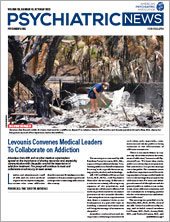This year, advocacy by the Minnesota Psychiatric Society (MPS) has helped lead to some big legislative wins in our state. Language requiring private insurers to reimburse collaborative care codes was included in the legislature’s omnibus commerce bill and signed into law. A new Mental Health Parity and Substance Abuse Accountability Office was established within the state’s Department of Commerce to oversee mental health parity compliance. We also secured statewide funding for a mental health program locator that MPS runs, which previously relied on grants, contracts, and donations for funding.
Some of these wins were helped by a unique legislative session in our state, driven by a significant surplus. But the wins were also supported by important relationships based on trust and respect that MPS members have intentionally built and maintained over many years.
MPS is part of a large coalition of mental health advocacy organizations, and it was thanks to our strong relationship with those groups that we were able to include priorities important to psychiatry, such as collaborative care, into their advocacy efforts this year. Additionally, we partnered with state employees in our work to strengthen Minnesota’s parity enforcement. Building trust with key players in state government is essential to successful advocacy, and that includes not just members of the legislature, but also legislative staff, other stakeholders, and state employees.
For several years, MPS has partnered with our state’s National Alliance on Mental Illness (NAMI) chapter to host what we’ve called “house parties” during the summer. We invite legislators to our homes or other convenient locations in their districts, along with some local MPS and NAMI members who are their constituents, to talk in a casual environment about issues that are important to them and our neighbors, as well as ourselves. During these events, we hear about our legislators’ mental health priorities and concerns and answer their questions. We also have the time to explain our perspectives and outline some of the best ways to ensure people in our communities are mentally healthy.
Additionally, meeting in the legislative off season has a host of other benefits. Legislators have more time, and we do not have to ask them to vote for or against specific bills. Whenever possible, it’s ideal to get to know legislators before asking them to vote certain ways. No one appreciates receiving demands from people they barely know. Our legislators, their staffs, and state employees are real people who, like us, have real job stressors to deal with themselves. Spending time getting to know each other and building trust can have a significant payoff in the long term.
Successful advocacy at the state level can often be a long game. Trust and respect are not established overnight but may take years to build and strengthen. But ultimately, making relationships in state government—be it with state agency employees, legislative staff members, or the legislators themselves—is no different from building relationships with colleagues or neighbors. Some acquaintances will become friends; others may not. What is most important is building mutual trust and respect so they rely on us as the mental health experts we are. In turn, we hope to establish the kind of relationship in which they welcome our initiating contact about new opportunities or to correct a misconception.
For those who don’t know where to start, sometimes the most important step is to just show up. For example, a member of Minnesota’s House of Representatives periodically hosts an informal meet and greet in a local coffeehouse. Two of MPS’s members showed up at each of these events for months. They’ve gotten to know the representative so well that if any legislation comes up dealing with behavioral health, he calls the MPS members and asks them to help him understand it. APA’s State Government Relations staff are also a great resource, and they are available to provide advocacy training and advice on how to build relationships with legislators.
We want our lawmakers to know they can rely on our psychiatric expertise. We want them to call us when bills related to mental health cross their desks. By taking the time to introduce ourselves to them and explain our perspectives, we can build the trust necessary to become experts on whom they rely. ■
Members interested in learning more about how to set up meetings with lawmakers can contact Erin Berry Philp at
[email protected].

